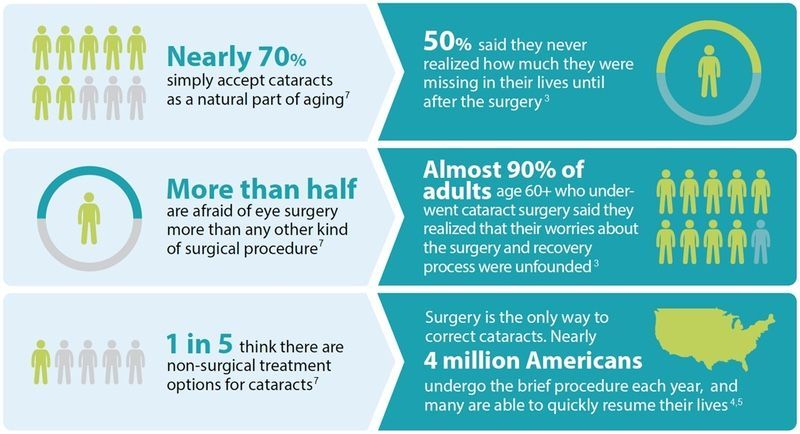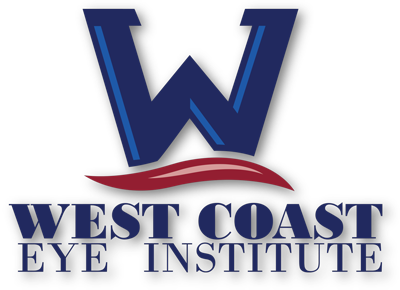If you have blurry, hazy, or dull vision, there’s a strong chance that you might have cataracts. If your visual impairment interferes with your daily activities and ability to work, you should consider your options for cataract surgery in Bakersfield, CA. At West Coast Eye Institute, we use the latest laser-assisted techniques to remove cataracts and provide multifocal lenses to liberate you from eyeglasses while restoring optimal vision.
Cataracts
Our eyes consist of a natural lens that bends (refracts) light rays to help us see clearly. The lens should be completely clear and transparent. A cataract is a condition wherein the lens becomes cloudy, which makes your vision seem foggy as if you’re looking through a dusty car windshield. If you have cataracts, objects will seem blurry, hazy, or less colorful.
- What’s the root cause of cataracts?
- You have a high risk of cataracts if:
- How can I prevent cataracts?
- What are the symptoms of cataracts?
What’s the root cause of cataracts?
Younger people may experience cataracts due to injuries, illnesses, or certain medications. Generally speaking, cataracts occur as you grow older, especially because of prolonged exposure to ultraviolet light. Furthermore, as you grow older, the normal proteins in your lens start to break down, leading to cloudy formations in the lens.
You have a high risk of cataracts if:
- You have a family history of cataracts.
- You have medical conditions that increase the risk of cataracts, such as diabetes.
- You have had eye surgery or radiation therapy on your upper body.
- You spend extended periods of time outdoors without sunglasses that block the UV rays.
- You smoke cigarettes regularly.
- You are over 55 years of age.
How can I prevent cataracts?
There are no sure means of preventing cataracts, but you can take measures to reduce its likelihood. You should protect your eyes from sunlight by wearing sunglasses that effectively block UV rays or glasses with a clear, anti-UV coating. You should also stop smoking. Talk to your ophthalmologist or eye doctor for more information on cataracts.
What are the symptoms of cataracts?
- Blurry or hazy vision
- Double vision
- Halos around lights
- Yellowish vision
- Poor night vision
- Poor vision in bright lights
Cataract Surgery
Cataract surgery is the safest and most common surgery in the US. Approximately 4 million Americans undergo cataract surgery every year and then resume their lives without any problems or complications. Furthermore, cataracts can’t be treated with non-surgical methods or techniques, so surgery is your only option.
No two eyes are the same, so no two cataract surgery should be approached as the same. However, generally speaking, cataract surgeries have two primary goals — remove the cataract and insert an artificial intraocular lens (IOL) into the eye. The surgery is painless, and it usually concludes within 20 minutes, following which you can return home once you have okay from the eye doctor.
- What is FLAC surgery?
- What are the benefits of FLAC surgery?
- How do I prepare for cataract surgery?
- How is cataract surgery performed?
- How long does cataract surgery last?
- What is the recovery period?
What is femtosecond laser-assisted cataract surgery?
Femtosecond laser-assisted cataract surgery (FLAC) is an advanced method of cataract removal. This technique utilizes a femtosecond to break up your cataract to allow for a more controlled way of cataract surgery in Bakersfield. The femtosecond laser technology creates precise incisions in the cornea to minimize the energy necessary to fragment the lens, thereby causing minimal damage to the surrounding tissues.
What are the benefits of the FLAC technique?
- It ensures consistent results due to less mechanical variability
- It can correct mild astigmatism as well, thereby improving your vision
- It involves less anesthesia
How do I prepare for cataract surgery?
You’ll have to start taking some eye drops a few days before your surgery. These eye drops will reduce swelling and prevent the likelihood of infections, thus improving the surgery’s outcome. You’ll be asked to avoid solid food for at least 6 hours before the surgery. Other than these guidelines, your ophthalmologist will provide specific instructions to prepare you for the procedure.
How is cataract surgery performed?
- You arrive at the surgery center and fill out the preoperative paperwork.
- The medical staff will dilate your eye with eye drops.
- The medical staff will start an intravenous (IV) line to provide anesthesia.
- You will be taken to the operative room.
- You will lay completely flat on the operating table.
- Once you are completely numb, the cleaning process will begin, and you’ll experience slight pressure along the orbital bones. However, there’s no pain.
- You’re asked to focus on a light show while we proceed with the surgery.
- Your cataracts are removed and replaced with intraocular lenses.
- The procedure concludes within 20 minutes.
- You can have someone drive you home.
How long does cataract surgery last?
A typical cataract surgery concludes within 20 minutes.
What is the recovery period after cataract surgery?
You’ll have to wear an eye patch after the cataract surgery, and someone will have to drive you home. We provide a protective shield that you must wear while sleeping for a few days. Your vision might be blurry for a few days, but it will improve rapidly. You may also experience some itching and discomfort, but you must not scratch your eyes. Complete healing takes about one month, but you can resume most of your daily activities, including driving, in a few days of cataract surgery in Bakersfield.
Intraocular Lenses (IOLs)
At the time of the removal of your cataract, your surgeon will replace it with an artificial lens. This intraocular lens (IOL) is picked based on your specific eye’s needs, measurements, and your wants for your visual outcome. Everyone has a different set of goals, so you must discuss them with your ophthalmologist to select the right intraocular lenses. Below, we highlight your intraocular lens options.
Standard Lens
A standard lens is a great option for most. It can be set for near or far distance, which means you’ll either need eyeglasses for myopia (nearsightedness) or hyperopia (farsightedness). The most common lens is the standard distance lens, which means you have great distance vision, but you’ll need help with reading. This is covered by insurance. After examination the correct lens for your cataract surgery in Bakersfield will be recommended.
Toric Lens
A toric lens is not for everyone. The toric lens is designed to help an eye that has a high amount of astigmatism, i.e., corneal irregularities prevent your eyes from bending light correctly. However, you can get toric lenses in the standard or PanOptix form. This is partially covered by insurance.
Alcon's PanOptix Lens
The PanOptix lens is a great lens and the first of its kind. With more than a 99% patient satisfaction rate, this lens is designed to be the closest we have on the market to “perfect.” It is designed to give you the optimal range of vision, independent of eyeglasses or contacts. This is partially covered by insurance.
Multifocal Lens
Multifocal lens implants make eyeglasses and contacts completely unnecessary. These lenses allow you to see clearly from all distances, so you don’t need eyeglasses. Some patients may still need glasses for very fine print, but most don’t need them ever again. Please talk to your ophthalmologist to determine if you’re a suitable candidate for multifocal lenses.
Schedule your cataract surgery in Bakersfield, CA
West Coast Eye Institute is the leading ophthalmology practice in Bakersfield, CA. Our eye surgeons treat all patients individually, curating surgical plans according to their unique goals and lifestyles. Please schedule an appointment to explore your options for cataract surgery in Bakersfield today.


